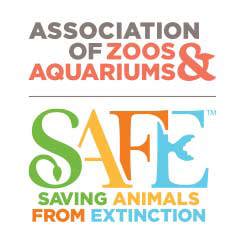
Western Lowland Gorilla
AZA SAFE: Saving Animals from Extinction
Zoo New England is proud to support the Association of Zoos and Aquariums' global collaborative conservation effort, SAFE: Saving Animals From Extinction.
 SAFE joins together the 180 million annual zoo and aquarium visitors with the resources and collective expertise of AZA members and partners to save the most vulnerable wildlife species from extinction.
SAFE joins together the 180 million annual zoo and aquarium visitors with the resources and collective expertise of AZA members and partners to save the most vulnerable wildlife species from extinction.
Through these programs, we move beyond conservation within our Zoo; SAFE programs are tied to measurable conservation initiatives for species in the wild. “As facilities that exhibit animals," says AZA president and CEO, Dan Ashe, "we have an obligation to take care of those animals in our facilities and provide exceptional care for them. But we also have an obligation to care for them in nature.”
Without critical intervention, we are facing the very real possibility of losing some of our planet’s most iconic creatures—such as cheetahs, elephants, gorillas, sea turtles and sharks. Through SAFE, we lend our expertise and funding to support threatened animals – before they are gone forever.
SAFE Species Zoo New England Supports

